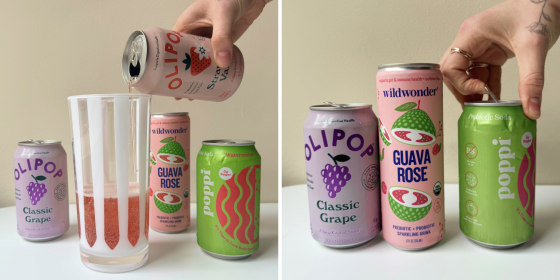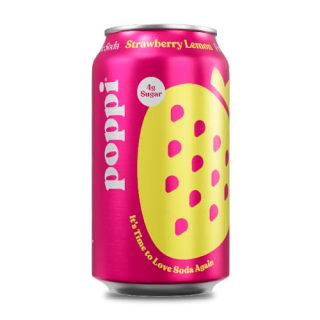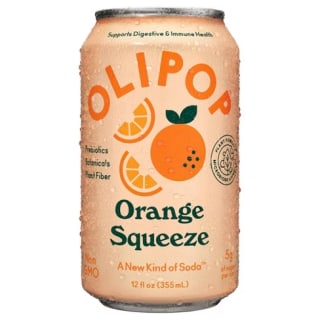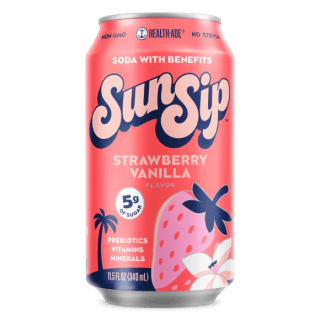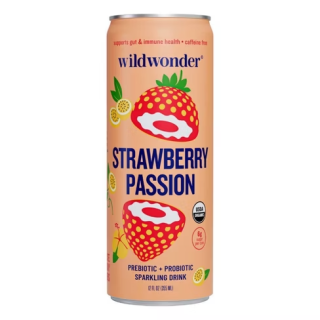We don’t always have the answers, but we have some people on speed dial who do — which is why we present to you our series FYI where we have experts explain if lip balm is actually bad, how often you should wash your hair and more.
Drinking soda has long been a debated subject in the nutrition arena. It’s a sugary beverage associated with weight gain, heart disease, tooth decay and cavities, according to the Centers for Disease Control and Prevention, and while diet options are available, they’re made with artificial sweeteners that some people avoid.
Because soda has a bad rap, many people turn to alternatives — lately, all eyes are on prebiotic soda. The bubbly beverage is fortified with prebiotic fibers and is typically lower in sugar and calories than traditional soft drinks. “These products try to mimic classic sodas’ look and taste, but use better-for-you ingredients,” says Christine Dang, a category manager at Thrive Market. “There’s been a groundswell of innovation, from entirely new soda brands to established beverage brands creating new soda lines.”
Prebiotic soda’s presence is growing in grocery stores and people’s refrigerators. But does it offer any health benefits? I talked to doctors and nutritionists to find out, and spoke to a trend expert about why the prebiotic soda bubble isn’t popping soon.
SKIP AHEAD What are prebiotics? | What is prebiotic soda? | Does prebiotic soda offer any health benefits? | Prebiotic soda v.s. standard soda | Final verdict | Our favorite prebiotic sodas | The inception of prebiotic soda | Why trust NBC Select?
What are prebiotics?
Prebiotics are non-digestible fibers and compounds that act as food for probiotics, which are beneficial bacteria in your gut, says Chloe Williams, a registered nutritionist and the owner of Eunoia Wellness Co. Inc. They pass through the upper part of your gastrointestinal tract undigested, and when they reach your colon, your gut microbiota ferments them to help stimulate the growth and activity of healthy bacteria, she says. “Think of your gut as a thriving garden,” says Williams. “Probiotics are the plants, and prebiotics are the fertilizer that helps those plants grow strong and healthy.”
The main benefit of prebiotics is their ability to boost or support your gut microbiome, says Dr. Eamonn Martin Quigley, head of Houston Methodist Hospital’s gastroenterology and hepatology division. By doing so, they’ve been linked to digestive health, including relieving constipation and bloating, as well as symptoms related to inflammatory bowel disease and irritable bowel syndrome, he says.
You can consume prebiotics in two ways: by eating prebiotic-rich foods and taking supplements, like a pill or powder. Examples of prebiotic-rich foods include bananas, onions, garlic, leeks, asparagus and whole grains like oats and barley, says Dr. Michael J. Ormsbee, the director of Florida State University’s Institute of Sports Sciences and Medicine. These foods contain fibers like inulin and fructooligosaccharides, which the good bacteria in your gut like to eat, he says.
What is prebiotic soda?
Prebiotic sodas are fizzy beverages fortified with prebiotics, often in the form of plant-based fibers like guar gum, inulin, chicory root and sunchokes, says Lisa Moskovitz, a registered dietician and CEO of the Virtual Nutrition Experts. They’re meant to help increase your daily intake of prebiotics through a tasty drink, and be part of a broader approach to supporting your gut microbiome, says Williams. Prebiotic sodas also act as an alternative to standard soft drinks, which tend to be high in sugar or made with artificial sweeteners some people try to stay away from, she says.
Does prebiotic soda offer any health benefits?
The idea behind prebiotic soda is that it contains fibers that feed the good bacteria (probiotics) in your gut, helping stimulate growth and activity that could, in turn, bolster your gut microbiome, says Moskovitz. However, whether or not these sodas successfully do that is unclear.
There’s currently a lack of data available about the effects of prebiotic sodas on the gut microbiome, which prevents anyone from drawing conclusive answers to questions about health benefits, says Quigley. Identifying solid health benefits involves evaluating what prebiotics each soda contains, whether those prebiotics exist in sufficient quantities to impact the gut microbiome, and, if so, what those impacts are, he says.
“The whole issue here is the conflict between claims and evidence,” says Quigley. In other words, brands may advertise that their prebiotic sodas support gut health or offer other benefits, but if they don’t provide evidence in the form of scientific data from legitimate studies, we don’t know whether those claims are true.
Is prebiotic soda better for you compared to standard soda?
Whether prebiotic soda is better for you compared to standard soda depends on how you define better, says Ormsbee. From an overall nutrition perspective, soda and diet soda offer no benefit, while prebiotic soda may offer some benefits due to their fiber content. However, the verdict is still out on whether prebiotic sodas are “healthier” due to a lack of evidence available from studies, he says.
With that said, there are some overall conclusions you can draw when comparing traditional sodas’ and prebiotic sodas’ nutrition labels. “Compared to regular soda, the amount of added sugar in most prebiotic sodas is considerably less, and there are less artificial chemical sweeteners, unlike calorie-free diet sodas,” says Moskovitz. “Both of these differences could be a plus for many people.” However, prebiotic soda isn’t sugar-free or calorie-free, so if that’s what you’re looking for, it may not be the right beverage for you.
Final verdict
All things considered, prebiotic sodas are generally safe to drink in moderation, says Quigley. But you should not rely on them as the sole source — or a significant source — of prebiotics in your diet, says Williams. Rather, they’re one piece of the puzzle, complementary to natural prebiotic sources, like some fruits, vegetables, whole grains and legumes. Also remember that nothing is a replacement for water in terms of hydration, so be sure you’re drinking enough H20 every day, says Moskovitz. And always talk to your doctor before adding something new to your diet.
Our favorite prebiotic sodas
If you’re interested in trying prebiotic soda, here are a few options NBC Select staff recommend based on taste and flavor preferences.
Poppi Sparkling Prebiotic Soda
I often have more Poppi than food in my refrigerator. I started buying the bubbly beverage when it launched in March 2020, and ever since, I’ve had one can a day, which has helped me reduce my diet soda consumption. Poppi is made with prebiotic fiber from agave inulin and apple cider vinegar, and sweetened with cane sugar and stevia. You can buy it in flavors like classic cola, doc pop (my favorite) and root beer, which mimic classic soft drinks, as well as fruity options like raspberry rose, lemon lime and orange. (Editor’s note: Poppi is in an ongoing lawsuit challenging some of its “gut healthy” claims. A spokesperson for Poppi told NBC Select that the brand stands behind its products, it believes the lawsuit is baseless, and it will defend against the allegations.)
Olipop Prebiotic Soda
“Not only does Olipop taste great, but it has some of the best flavors I’ve seen in a soda,” says Mili Godio, NBC Select updates editor. “You just can’t go wrong with whatever flavor you choose — my personal favorites are strawberry vanilla and orange squeeze. I usually order it in bulk on Amazon so my fridge is always stacked.” Olipop’s beverages are made with a blend of plant-based fiber, like cassava root fiber, chicory root inulin and Jerusalem artichoke inulin, and they’re sweetened with stevia. You can purchase Olipop in 18 flavors, including fruit-forward options like watermelon lime, lemon lime and tropical punch, as well as those that mimic classic sodas, like vintage cola and ginger ale.
Sun Sip Prebiotic Soda
Dang says some established brands are launching prebiotic soda lines, which Sun Sip is a great example of. It’s owned by Health-Ade, a kombucha company that’s been around since 2012. Sun Sip’s beverages are made with prebiotic fibers from agave inulin and they’re sweetened with fruit juice, monk fruit and cane sugar. You can purchase this prebiotic soda in four flavors: raspberry lemonade (my favorite), cherry cola, strawberry vanilla, lemon lime and root beer.
Wildwonder Prebiotic + Probiotic Sparkling Drink
Wildwonder is one of our favorite women-owned and AAPI-owned brands. Its beverages are made with prebiotic fibers from Jerusalem artichoke and chicory root inulin, and they’re sweetened with monk fruit. They also have probiotics in their formula. You can purchase Wildwonder’s drinks in six flavors: raspberry lychee, strawberry passion, pineapple paradise, guava rose, mango gold and peach ginger. I find the brand’s beverages to be flavorful but not too sweet, and they’re great to make mocktails with. I’ve added non-alcoholic spirits to them for dinner parties.
The inception of prebiotic soda: Where did these drinks come from?
Prebiotic sodas began popping up about five years ago, but under a different name. Some of the earliest products called themselves “prebiotic drinks” or “health tonics,” which didn’t translate to shoppers, says Dang. “There wasn’t a specific category these products would play in,” she says. “They always sat somewhere between sparkling water or juices.” Shoppers didn’t understand what the beverages were and where to find them, two issues brands solved when they began positioning themselves as soda alternatives about two years ago. “Now that these brands have started to coin the term soda on their packaging, we’ve found that shoppers can quickly identify and understand what the product is,” says Dang.
Dang compares the growing popularity around prebiotic soda to that of probiotic-rich kombucha when brands started heavily marketing it as a “better for you” beverage. But prebiotic sodas have a leg up in terms of appeal due to their flavor. “Probiotic beverages like kombucha are typically fermented and have a sour-like taste that can polarize consumers,” says Dang. “On the other hand, prebiotics are usually fiber-rich and fruit- or root-based, but do not require fermentation until they’re ingested in the gut. Prebiotic soda brands have taken innovation even further by creating beverages that mimic classic soda flavors, like your favorite cola, with a focus on taste.” Prebiotic soda is a relatively new category within the beverage market, so Dang expects it to continue growing. She’s even seen a few prebiotic soda brands listed on restaurant menus next to traditional soft drink brands, which is a sign that they’re continuing to permeate the market and expand their reach.
Meet our experts
At NBC Select, we work with experts who have specialized knowledge and authority based on relevant training and/or experience. We also take steps to ensure that all expert advice and recommendations are made independently and with no undisclosed financial conflicts of interest.
- Christine Dang is a category manager at Thrive Market.
- Chloe Williams is a registered nutritionist and the owner of Eunoia Wellness Co. Inc.
- Dr. Eamonn Martin Quigley is the head of Houston Methodist Hospital’s gastroenterology and hepatology division.
- Dr. Michael J. Ormsbee is the director of Florida State University’s Institute of Sports Sciences and Medicine.
- Lisa Moskovitz is a registered dietician and CEO of the Virtual Nutrition Experts.
Why trust NBC Select?
I’m a reporter at NBC Select who writes about food and beverages, including articles on chocolate, salt, honey, olive oil and coffee subscriptions. For this article, I interviewed five experts about prebiotic sodas. I also recommended prebiotic sodas NBC Select staff enjoy drinking.
Catch up on NBC Select’s in-depth coverage of tech and tools, wellness and more, and follow us on Facebook, Instagram, Twitter and TikTok to stay up to date.
